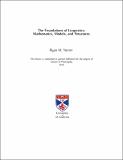The foundations of linguistics : mathematics, models, and structures
Abstract
The philosophy of linguistics is a rich philosophical domain which encompasses various disciplines. One of the aims of this thesis is to unite theoretical linguistics, the philosophy of language, the philosophy of science (particularly mathematics and modelling) and the ontology of language. Each part of the research presented here targets separate but related goals with the unified aim of bringing greater clarity to the foundations of linguistics from a philosophical perspective.
Part I is devoted to the methodology of linguistics in terms of scientific modelling. I argue against both the Conceptualist and Platonist (as well as Pluralist) interpretations of linguistic theory by means of three grades of mathematical involvement for linguistic grammars. Part II explores the specific models of syntactic and semantics by an analogy with the harder sciences. In Part III, I develop a novel account of linguistic ontology and in the process comment on the type-token distinction, the role and connection with mathematics and the nature of linguistic objects.
In this research, I offer a structural realist interpretation of linguistic methodology with a nuanced structuralist picture for its ontology. This proposal is informed by historical and current work in theoretical linguistics as well as philosophical views on ontology, scientific modelling and mathematics.
Type
Thesis, PhD Doctor of Philosophy
Rights
Attribution-NonCommercial-NoDerivatives 4.0 International
http://creativecommons.org/licenses/by-nc-nd/4.0/
Collections
Except where otherwise noted within the work, this item's licence for re-use is described as Attribution-NonCommercial-NoDerivatives 4.0 International
Items in the St Andrews Research Repository are protected by copyright, with all rights reserved, unless otherwise indicated.
Related items
Showing items related by title, author, creator and subject.
-
The starry heavens above and the moral law within : Kant’s grounding of freedom in experience by way of a principle of intellectual causality, discovered in his third Critique
Paterson, Gareth Hugh (University of St Andrews, 2021-06-28) - ThesisKant claims in his third Critique (1790) to have proven that the idea of freedom is scibilium, known with certainty. My aim is simply to take his claim seriously. This involves the attempt, which Kant himself suggests in ... -
Plato on time as a cosmic phenomenon
Lazzarini, Lorenzo (University of St Andrews, 2020-07-27) - ThesisThe thesis presents an original interpretation of the account of time in the Timaeus (37c6-39e2), arguing that time in Plato is best conceived of as a cosmic phenomenon. In Part I, my view is contrasted in crucial respects ... -
Introduction to the Special Issue on Lakatos’ Undone Work
Nagler, Sophie; Pillin, Hannah; Sarikaya, Deniz (2022-04-22) - Journal articleWe give an overview of Lakatos’ life, his philosophy of mathematics and science, as well as of this issue. Firstly, we briefly delineate Lakatos’ key contributions to philosophy: his anti-formalist philosophy of mathematics, ...


